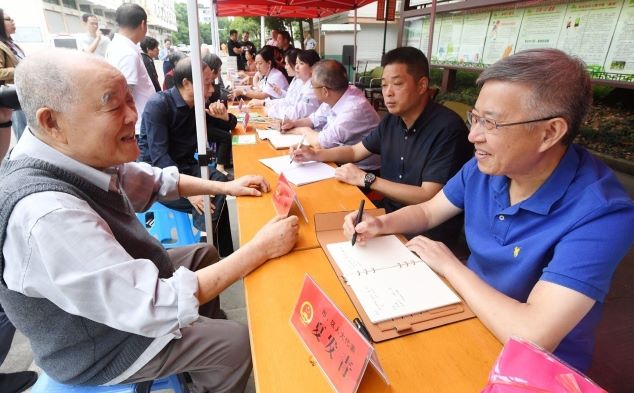Communication mechanism builds closer ties between public, deputies to people’s congress
By Zhong Ziwei, People’s Daily
Deputies to the people’s congress of Luqiao district, Taizhou, east China’s Zhejiang province listen to suggestions raised by residents of a neighborhood in the district on May 22, 2019. Photo by Wang Baochu/People’s Daily Online
Speaking of the changes to the traffic facilities near his home, Ji Yizong, a citizen in Xiamen, southeast China’s Fujian province, was quite satisfied.
“The city has separated pedestrian and vehicle traffic on the main roads, installed traffic signals on some pedestrian paths, and is planning to build pedestrian underpass at intersections,” said Ji.
These changes happened after Ji reported relevant problems last summer to a neighborhood office established to strengthen ties between deputies to the people’s congresses and the public.
Sitting next to Xiamen University and South Putuo Temple, a famous Buddhist sacred spot, the neighborhood where Ji lives sees huge passenger and vehicle traffic volumes. Traffic congestion on holidays always brought negative impacts on the daily life of local residents.
These problems reported by Ji drew close attention from Ze Wu, a deputy to the National People’s Congress who later made detailed investigations and reached out to relevant organizations, and raised a proposal on improving the traffic conditions in surrounding neighborhoods.
To Ji’s surprise, Ze invited him to share his opinions and discuss relevant issues with local lawmakers.
“Through discussions, I realized that traffic congestion is a problem for the whole area. It was tackled before, but received little effect. Now, with concerted efforts from multiple departments, the problem has been completely solved,” Ji said.
The city always focuses on people’s needs. In recent years, the standing committee of the municipal people’s congress of Xiamen has served as a bridge between deputies and the public and strengthened communication between the two sides.
So far, 38 townships and 6 districts in Xiamen have set up offices to promote communication between deputies and the public, as well as 442 stations serving similar purposes, covering all townships and villages in the city.
“The purpose of the communication mechanism is to make it more convenient for deputies to listen to the needs of the people, and better fulfill their responsibilities,” said Liu Shaoqing, deputy director of the standing committee of Xiamen municipal people’s congress.
Xiamen has included 2,227 deputies to people’s congresses at various levels on the communication platform to form a stable communication network between deputies and the public. It also established service stations in five industries such as enterprises, schools and hospitals to provide tailored services for the public by giving full play to the advantages of deputies in these sectors, such as teachers, doctors and legal services providers.
“The communication mechanism has become an important platform for solving hotspot and difficult issues encountered by the public, such as garbage sorting, elderly care, traffic congestion and renovation of residential communities,” said Chen Xuling, a deputy to the people’s congress of Huli district, Xiamen.
Regarding the disputes between property management committees and residents’ committees in the district she found when visiting neighborhoods and communicating with the residents, Chen proposed to pay more attention on the construction of residents’ committees, and promoted the drafting of relevant documents, to ensure that the management and construction of residential communities has rules to follow.
“Through the platform, deputies could live up to the commitment that ‘the people selected me as a deputy, and I must serve them as a deputy,’” Liu said.
Last year, deputies to the people’s congresses in Xiamen received 4,038 suggestions raised by the public through the communication mechanism, and solved 3,275 of them. For problems that couldn’t be handled at the township level, the deputies turned them into proposals and suggestions, which were later handled under the supervision of the standing committees of the municipal and district people’s congresses and special committees. Over the past three years, seven proposals and 979 suggestions raised by deputies to the municipal people’s congress were handled.













